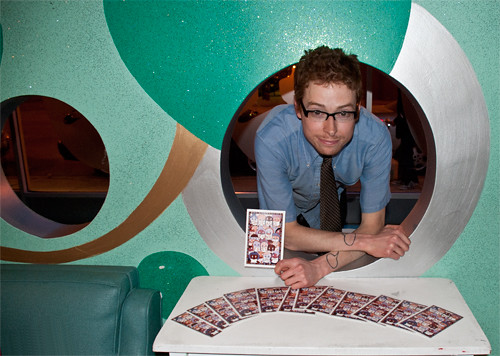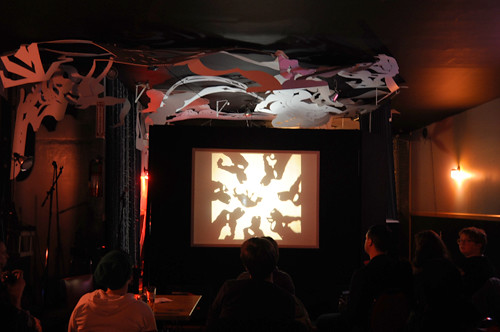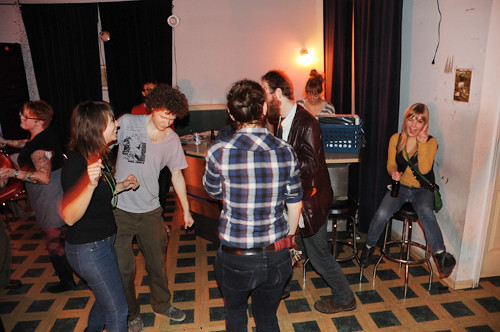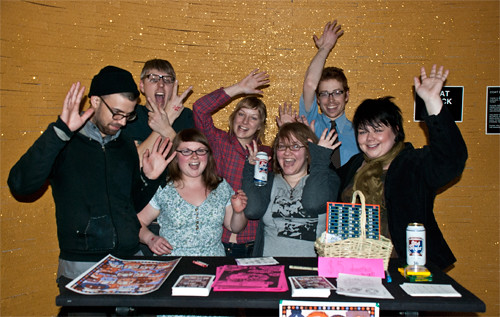| « Fish Mysteries | Bookmarks » |
Feature Fri Mar 11 2011
DIY Refuses to Die: Chicago Zine Fest Year 2
DIY Refuses to Die is a new, weekly feature by guest writer Taleen Kalenderian that will run in the weeks leading up to the Chicago Zine Fest, happening March 25th and 26th at various locations throughout the area. Each week, we'll feature an interview from a notable in Chicago's zine scene, and exposition on an aspect of the landscape as well as their role in it. She kicks it off appropriately with Neil Brideau, one of the founding and current organizers of the fest.
After running into a slew of Chicago zinesters at Milwaukee Zine Festival in November of 2009, Neil Brideau and his friends co-founded Chicago Zine Festival (CZF) almost a year ago. Realizing that a Chicago zine community was in the make, with zines going unshared during Chicago winters, they decided to bring together the city's zinesters, comics artists and writers, hosting 45 exhibitor tables and self-publishing programs at Columbia College of Chicago.
Get ready for year two: CZF has doubled in size, hosting 107 exhibitor tables that sold out in three weeks and taking up two floors in Columbia's Conaway Center, in addition to events and readings at Quimby's Bookstore and 826CHI. All events are free and open to the public, including letterpress and bookbinding workshops to foster and promote print culture. There's even a DIY Film Festival.
Whether you want to trade some zines, swap skills or chime in on some zinester karaoke, it all takes place on Friday, March 25 and Saturday, March 26. You should go: 'cause you can't kill print if it goes viral.
Neil Brideau had a chance during the hectic weeks leading up to CZF to chat with Gapers Block on his walk home from his Quimby's shift.

Neil Brideau
What was the first zine you made?
I made single pages of comics in college that I would put up on a campus bulletin board because I wanted to do more comics than the space I had in the school newspaper. I'm working on a new zine right now about comics called Side Kick, but I've done a number of mini-comics that are all sort of one-shots. Hopefully it'll be done in time for the fest.
What kinds of zines have you seen popping up this year?
I'm seeing that style wise, people are gravitating toward the quarter size, which is an 8 ½ by 11 sheet of paper folded in half, and then cut in half. It's not a new style but I'm seeing more of it. It's a fun, compact, cute-looking object. Zinesters are paying more attention to the zine as an object in addition to its content.
What do you think that has to do with?
With more stores making space for zines and websites like Etsy where a lot of zinesters are setting up stores, I think they've been influenced by seeing crafty endeavors. That's inspired people to make more visually impressive zines that are more interesting in a tactile way, actually considering what it's like holding it in your hands.
It sounds like CFZ, a fairly recent community, has been getting the whole Chicago community involved. Your last fundraiser at Cole's even had a puppet group performance by Manual Cinema.
I think a lot of people, even if they're not making zines, are interested again in do-it-yourself culture. The shadow puppetry that happened at the fundraiser, 3 people made all of that themselves including the music, the puppetry and the set. They made that big screen too. There's a large DIY culture that spans genres in Chicago. When something like zine fest comes along, people get excited to make stuff.

Manual Cinema puppet show
What zines are you excited about?
My neighbor Tanis Clark is going to be there with her cookzine Vegan Slut, and there's another vegan zine by Chiara Keeling-Gonzalez called How To Get Fat Being Vegan.
I'm excited about a couple of groups of folks coming from Canada and New Zealand. That's definitely one of my favorite things about going to zine festivals; you get people from all over the country, and Canada Europe and Australia. You had no idea that they were going to be there and suddenly there's this brand new exciting zine you get to see for the first time.
That's like traveling to see your favorite band tour. That enthusiasm reminds me of our conversation last year where you mentioned meeting someone who hadn't made a zine for 10 years, who made a zine for the festival.
That was really exciting.
Do you see that kind of energy leading into this year's festival?
At the number of fundraisers we had a box where you could drop your name, and we gave a free half table to the winner. That ended up being Morgan Rozacky who is making a zine called Some Things and it's their first zine festival, where they're showcasing their first zine for the first time.

Zinesters dance at a fundraiser at Cole's Bar
Do you think CZF has contributed to more zines/distros in Chicago?
There's definitely anecdotal evidence. Going back to the DIY movement stretching across genres, it seems like there's an increase of DIY art spaces going on, and a lot of it has to do with a larger trend of people being interested in creating their own fun and their own media. That's partially because of the increase of user-generated content that's come up on the Internet. Creating your own media and not waiting for larger entities to create it for you.
Do you think trading zines is an analog way of commenting on each others' online presences?
Trading zines goes back to the beginning of zine culture. The interpersonal relationships and the connection you make with people by trading, writing to people or meeting them at a zine fest is a critical part of zine culture. It's a far more personal thing to write someone a letter than dropping a quick comment on a blog.
Tell us a little bit about original zine culture.
In terms of history it's always been a reaction to the unmarketability of content and the people creating the content deciding they were going to be published because they were doing it themselves.
You can argue as to when original zines were created...Benjamin Franklin and Thomas Paine were printing their own pamphlets! Modern day zines started in the 1930s as a reaction to writers, who were interested primarily in writing for science fiction magazines, and pulp magazine writers whose works were rejected. They started publishing their own zines, and I believe they actually used the term zine.
When you get into the '60s you've got people like R. Crumb who ran the underground comics in San Francisco and also here in Chicago who were publishing comics primarily because comics had a code of restrictions that the publishers couldn't break (otherwise they'd get blacklisted). Comics at that time were really saccharine and vanilla. They didn't really speak to the counterculture that was really active in the '60s so they decided to spread their own stuff.
In the '70s, '80s and '90s a lot of the zines being produced were music related fanzines in which people -- many of them punks -- wanted to write and read about this unmarketable music, so they published their own stuff and handed them out or sold them at shows for a couple of bucks.

Chicago Zine Fest co-founders at Bingo Night Fundraiser
Printing and making a zine isn't the most convenient way to disseminate information today, particularly with the advent of social medias. Choosing the zine format says something very specific.
It's definitely a more powerful act to go through the process of writing a zine than a blog. I think what makes it a powerful medium is how little of a barrier there is between reader and author. Regardless of the content and how much you create, you're using some other large company's blog interface or Facebook page. It's all other corporations deciding how to produce your content as opposed to zines, which you can create however you want.
-By Taleen Kalenderian









